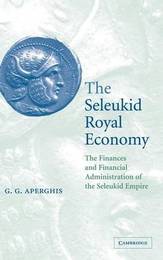
|
The Seleukid Royal Economy: The Finances and Financial Administration of the Seleukid Empire
Hardback
Main Details
| Title |
The Seleukid Royal Economy: The Finances and Financial Administration of the Seleukid Empire
|
| Authors and Contributors |
By (author) G. G. Aperghis
|
| Physical Properties |
| Format:Hardback | | Pages:378 | | Dimensions(mm): Height 229,Width 152 |
|
| Category/Genre | World history - BCE to c 500 CE
Economic history |
|---|
| ISBN/Barcode |
9780521837071
|
| Classifications | Dewey:938.08 |
|---|
| Audience | | Professional & Vocational | |
|---|
| Illustrations |
5 Tables, unspecified; 1 Maps
|
|
Publishing Details |
| Publisher |
Cambridge University Press
|
| Imprint |
Cambridge University Press
|
| Publication Date |
23 December 2004 |
| Publication Country |
United Kingdom
|
Description
The Seleukid empire, the principal successor-state of the empire of Alexander the Great, endured for over 200 years and stretched, at its peak, from the Mediterranean to the borders of India. This book provides a wide-ranging study of the empire's economy and the methods used by the Seleukid kings to monetise and manage it so as to extract tribute, rent and taxes as efficiently as possible. It uses a variety of Greek literary sources and inscriptions, cuneiform texts, archaeological, numismatic and comparative evidence to explore in detail the manner of exploitation of their lands and subjects by the Seleukid kings, their city-building activity, the financing of their armies and administration, the use they made of coinage and their methods of financial management. The book adopts a highly-original numerical approach throughout, which leads to a quantified model of the economy of an ancient state.
Author Biography
Makis Aperghis originally studied engineering at the University of Cambridge. He returned to the study of Ancient History and was awarded a doctorate from University College London (2000).
Reviews'... the book succeeds in raising fundamental questions about the economy in imperial states. Aperghis' study is therefore relevant for more than economic history alone. Offering valuable insights into, and raising fundamental questions about, the finances of the Seleukid Empire, it is also of interest for political historians working on Greco-Macedonian imperialism in the East, perhaps even for those interested in the functioning of empires in general.' Bryn Mawr Classical Review
|